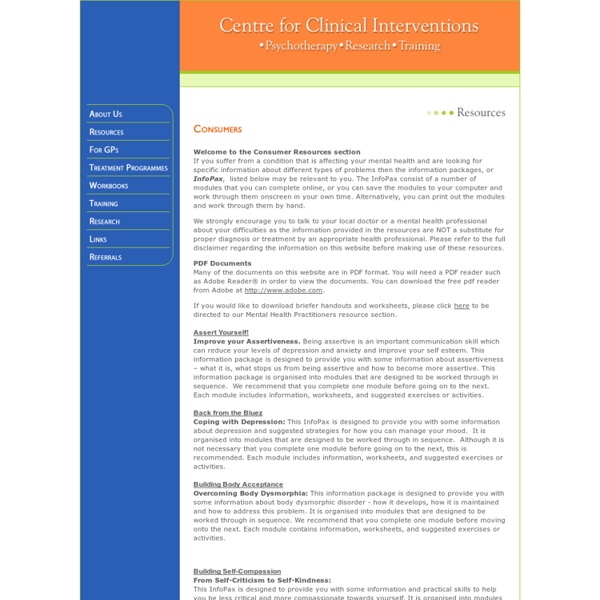



Cool text Symbols for Facebook ツ Beautify your statuses, comments, messages and your general texting life with symbols. Make your concepts stand out from the crowd by just one more way - looking charming. Symbols will empower your meaningful, mindful and tasteful ideas by further inspiring your audience with adorable forms of the world's most known and refined signs. Read my corresponding article if you'll want to put some symbols into Facebook name and you'll have trouble with that. Copied. Click a symbol on white background to auto-copy it.
Positive Psychology Exercise - Emoclear Self-Helpapedia Emoclear Positve Psychology Exercise I: Doing Pleasurable, Important, and Meaningful Activities Every day for two weeks do the following: 1. Choose a pleasurable activity to do alone and do it to completion. Emoclear Positive Psychology Exercise II: Building Character. Based on Character Strengths (Peterson & Seligman, 2004). For two weeks pick two activities per day from the list below. The Activity List: 1. Here's a reflection exercise for accessing appreciation and gratitude: This exercise is to be done daily for two weeks. 1. Have fun, Steve SheepShaver builds for Mac OS X, links and downloads • E-Maculation Forum Currently recommended SheepShaver build for Mac OS X: 01 February 2014 build For PPC and Intel Mac, OSX 10.4 (Tiger) through OSX 10.9 (Mavericks) Download: ... 140201.zip Installation and setupIf you have an existing SheepShaver setup, you can simply replace the application with the new application. If you set up SheepShaver for the first time, you will also need a compatible ROM file and a retail MacOS install CD (or a install CD disk image). For other than US English keyboard layouts the included keycodes file is needed. A first install on Intel machines will run in 32-bit mode by default. The included SheepShaver Scripts can be used to delete the prefs and nvram files to be able to start a new setup from scratch. Setup manualSee the setup manual for more information: ... os_x_setup Improvements since July 15, 2012 build Known issues - On PPC machines:Like previous builds, very CPU hungry.
List of cognitive biases In psychology and cognitive science, cognitive biases are systematic patterns of deviation from norm and/or rationality in judgment.[1][2] They are often studied in psychology, sociology and behavioral economics.[1] A memory bias is a cognitive bias that either enhances or impairs the recall of a memory (either the chances that the memory will be recalled at all, or the amount of time it takes for it to be recalled, or both), or that alters the content of a reported memory. Explanations include information-processing rules (i.e., mental shortcuts), called heuristics, that the brain uses to produce decisions or judgments. Biases have a variety of forms and appear as cognitive ("cold") bias, such as mental noise,[3] or motivational ("hot") bias, such as when beliefs are distorted by wishful thinking. Both effects can be present at the same time.[4][5] Although this research overwhelmingly involves human subjects, some studies have found bias in non-human animals as well. [edit] Association:
A Little Meditation Goes a Long Way I consider myself something of a prospective meditator—meaning that a serious meditation practice is always something I’m about to start… next week. So for years, I’ve been making a mental note of new studies showing that meditation can literally change our brain structure in ways that might boost concentration, memory, and positive emotions. Jacob Wackerhausen The results seem enticing enough to make anyone drop into the full lotus position—until you read the fine print: Much of this research involves people who have meditated for thousands of hours over many years; some of it zeroes in on Olympic-level meditators who have clocked 10,000 hours or more. Pretty daunting. Well, a new study offers some hope—and makes the benefits of meditation seem within reach even for a novice like me. The researchers tracked 16 people who were participating in the Mindfulness-Based Stress Reduction (MBSR) program, the training program developed more than 30 years ago by Jon Kabat-Zinn.
Therapy Worksheets